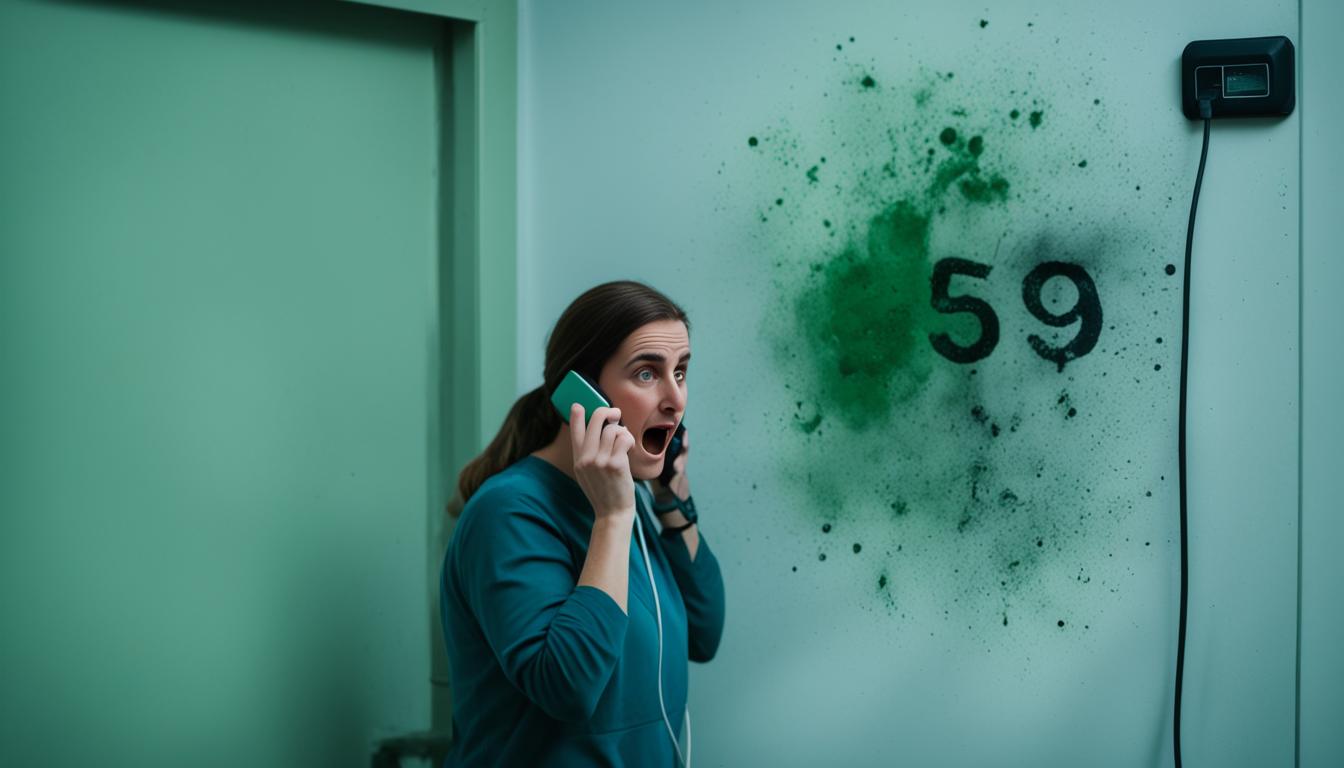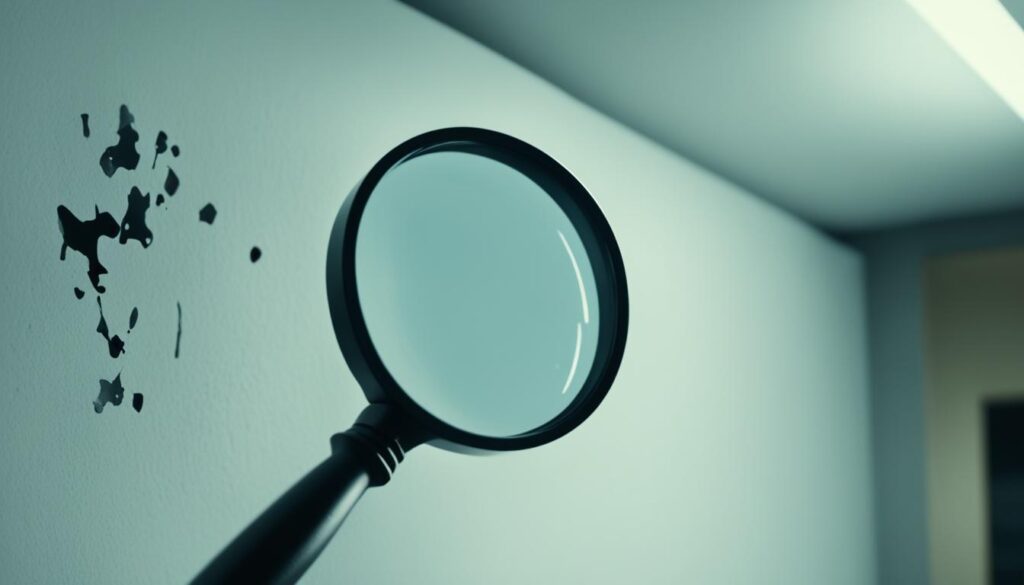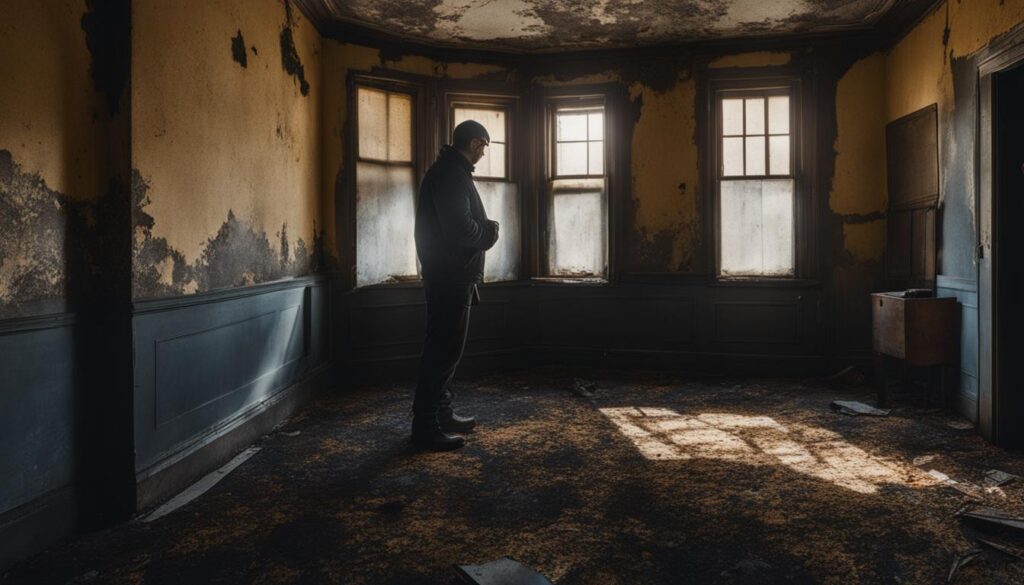
Reporting Mold to Health Dept – Landlord Issues
As a tenant, it is crucial to be aware of your rights when it comes to mold exposure in your rental property. Mold growth can not only cause significant damage to the property but also pose potential health risks to you and your loved ones. If you suspect mold in your rental property, you may be wondering if you can call the health department on your landlord for mold-related issues. In this section, we will explore tenant rights in mold exposure cases and discuss the steps you can take to report the issue to the health department.
Key Takeaways:
- Tenants have rights when it comes to mold exposure in rental properties.
- Reporting mold to the health department may be necessary to address the issue properly.
- Understanding the potential health risks associated with mold is crucial for tenants.
- Landlords have responsibilities when it comes to mold inspections and remediation.
- Resolving mold-related disputes between landlords and tenants may require professional intervention.
Understanding the Health Risks of Mold in Rental Properties
Mold is a common issue that can arise in rental properties, and its presence can have significant health implications for tenants. It is essential to understand the potential health risks associated with mold exposure and take prompt action to address the problem.
Potential Health Risks of Mold Exposure
Mold spores can trigger a variety of health problems, especially in individuals with allergies, asthma, or compromised immune systems. The most common health issues caused by mold exposure include:
- Respiratory problems such as coughing, wheezing, and shortness of breath
- Allergic reactions, including sneezing, runny nose, and itchy eyes
- Skin irritation, rashes, and dermatitis
- Headaches, dizziness, and fatigue
These symptoms can vary in severity depending on the individual’s sensitivity to mold and the extent of exposure. In some cases, prolonged exposure to mold can lead to more severe health complications.
The Importance of Addressing Mold Issues Promptly
Addressing mold issues promptly in rental properties is crucial to protect the health and well-being of tenants. Untreated mold growth can exacerbate existing health conditions and lead to the development of new ones. Furthermore, mold can spread rapidly and contaminate larger areas if left unchecked.
“Mold is not something to be taken lightly. It can have a significant impact on the health of tenants if not addressed promptly and effectively.” – Dr. Emily Thompson, Allergist
Tenant rights mold exposure and health department mold inspection play essential roles in ensuring that landlords take the necessary steps to address mold problems and maintain safe living conditions for their tenants. By understanding the potential health risks of mold and acting promptly, tenants can protect their health and hold their landlords accountable for maintaining mold-free rental properties.
Mold Inspection and Landlord Responsibilities
When it comes to maintaining a safe and healthy living environment for tenants, landlords have crucial responsibilities, especially regarding mold growth. Landlords bear the responsibility of conducting regular mold inspections in rental properties to ensure the well-being of their tenants and comply with health and safety regulations.
Landlords must proactively address any signs of mold growth, as it can pose significant health risks to tenants. Mold can trigger allergies, respiratory issues, and even contribute to the development of more severe health conditions. Therefore, prompt action is essential.
Here are the key steps landlords should follow to fulfill their responsibilities in addressing mold growth:
- Regular Inspections: Landlords should conduct regular mold inspections in their rental properties. These inspections should be thorough and include areas prone to moisture accumulation, such as bathrooms, kitchens, basements, and crawl spaces.
- Prompt Mitigation: If mold growth is detected during an inspection, landlords should take immediate action to mitigate and resolve the issue. This may involve hiring professional mold remediation services to ensure proper removal and prevention of future mold growth.
- Documentation: Landlords should maintain detailed documentation of all mold inspections, including dates, findings, and actions taken. This documentation serves as crucial evidence of the landlord’s proactive approach to addressing mold issues.
- Communication: Effective communication with tenants is vital in addressing mold growth. Landlords should inform tenants about the mold inspection schedule and any findings. Additionally, they should provide clear instructions on how tenants can report any signs of mold growth between inspections.
- Preventive Measures: Landlords should implement preventive measures to minimize the likelihood of mold growth. These measures may include proper ventilation, moisture control, and regular maintenance of plumbing and HVAC systems.
By fulfilling their mold inspection and remediation responsibilities, landlords can ensure a safe and healthy living environment for their tenants. It is essential for both landlords and tenants to prioritize proactive measures to prevent mold growth and address any issues promptly.
“Landlords play a crucial role in maintaining a healthy living environment for tenants. By conducting regular mold inspections and taking prompt action, landlords can protect their tenants from potential health risks associated with mold exposure.”

Reporting Mold to the Health Department
As a tenant, it is crucial to take action if you suspect or discover mold in your rental property. Reporting the issue to the health department can help ensure that your health and rights are protected. Here is a step-by-step guide on how to report mold to the health department:
- Document the mold: Take clear photographs or videos of the mold growth in your rental unit. Make sure to include any visible damage and areas affected by mold.
- Notify your landlord: Report the mold issue to your landlord as soon as possible. Follow any procedures outlined in your lease agreement regarding reporting maintenance issues.
- Document communication: Keep a record of all communications with your landlord regarding the mold issue, including dates, times, and a summary of the conversations.
- Research local health department: Locate the contact information for your local health department. You can typically find this information on the official website of your city or county.
- Contact the health department: Reach out to the health department and provide them with the necessary details regarding the mold issue. Be prepared to provide information such as your name, address, landlord’s contact information, and a description of the mold problem.
- Follow health department instructions: Follow any instructions provided by the health department, which may involve scheduling a mold inspection or providing additional documentation.
Remember, reporting mold to the health department helps ensure compliance with health and safety regulations, and it can also assist in the resolution of the issue with your landlord. By taking proactive steps, you can play a vital role in protecting not only your own health but the well-being of other tenants as well.
Tenant Rights and Mold Exposure
Mold exposure can pose serious health risks to tenants. It is essential to be aware of your rights when it comes to mold in rental properties. In many states, tenants have the right to a habitable living environment, free from mold and other hazardous conditions. If your landlord fails to address the mold issue, you may have legal grounds to seek remedies such as rent reduction, lease termination, or even financial compensation for health-related expenses.
Mold Remediation in Rental Properties
In cases where mold growth is found in rental properties, it is crucial for landlords to prioritize mold remediation to ensure the health and safety of their tenants. Mold can pose serious health risks, and prompt action is necessary to mitigate the problem and prevent further damage. Here, we will discuss the process of mold remediation in rental properties and the steps that landlords should take to ensure the issue is properly addressed.
The Mold Remediation Process
The first step in mold remediation is conducting a thorough assessment of the affected area. This may involve hiring a professional mold inspector to identify the extent of the mold growth and determine the most appropriate course of action. It is recommended to engage certified mold remediation experts who have the necessary knowledge and experience to handle the process effectively.
Once the assessment is complete, the next step is to establish containment measures. This involves isolating the affected area to prevent mold spores from spreading to other parts of the property. Proper containment methods may include sealing off vents, using plastic barriers, and creating negative air pressure with the help of specialized equipment.
After containment is in place, the actual remediation process begins. This typically involves removing the mold-infested materials, such as drywall or carpets, and thoroughly cleaning the area using appropriate antimicrobial agents. It is important to follow industry guidelines and safety protocols during the remediation process to ensure the effective removal of mold and prevent its regrowth.
Landlord Responsibilities
Landlords have a legal responsibility to provide habitable and safe living conditions for their tenants. When it comes to mold remediation, landlords should take the following steps:
- Respond promptly to tenant complaints or reports of mold growth.
- Hire qualified professionals to assess and remediate the mold problem.
- Ensure proper communication with tenants about the remediation process and any necessary precautions they should take.
- Keep records of all actions taken, including inspections, remediation efforts, and any communication with tenants.
- Regularly inspect and maintain the property to prevent the recurrence of mold growth.
By fulfilling these responsibilities, landlords can demonstrate their commitment to maintaining a safe and healthy rental environment for their tenants.
Achieving Effective Mold Remediation in Rental Properties
To ensure effective mold remediation in rental properties, it is essential to address the root cause of the mold growth. This may involve identifying and repairing any sources of moisture, such as plumbing leaks or inadequate ventilation. By eliminating the conditions conducive to mold growth, landlords can minimize the likelihood of recurrence and protect the health of both current and future tenants.
| Benefits of Proper Mold Remediation |
|---|
| 1. Improved indoor air quality and health for tenants |
| 2. Prevention of structural damage to the property |
| 3. Reduced liability for the landlord |
| 4. Enhanced tenant satisfaction and retention |
By taking proactive measures to address mold issues in rental properties, landlords can safeguard their investment and ensure the well-being of their tenants. It is important to adhere to local regulations and guidelines regarding mold remediation and consult with professionals in the field for expert advice and assistance.
Dealing with Landlord-Tenant Disputes over Mold
Resolving mold-related disputes between landlords and tenants can be a challenging task. However, understanding the responsibilities of both parties and knowing the available resources can help in finding a satisfactory solution. Here are some steps to take when dealing with a landlord-tenant mold dispute:
-
Evaluate the Lease Agreement
First, thoroughly review your lease agreement to understand the rights and responsibilities of both the landlord and the tenant regarding mold issues. Pay close attention to any clauses related to mold inspection, repair, and maintenance.
-
Document the Mold Issue
Take detailed photographs or videos of the mold growth and any resulting damages. It is essential to document the issue to have evidence and a clear understanding of the severity of the mold problem.
-
Contact the Landlord
Notify your landlord in writing about the mold problem, providing all the necessary documentation. Be sure to keep copies of all communication and correspondence related to the issue, including emails, letters, and text messages.
-
Request a Mold Inspection
Ask your landlord to conduct a professional mold inspection to assess the extent of the problem. Mold inspections are typically the responsibility of the landlord, as they are responsible for maintaining the property in a habitable condition.
-
Seek Legal Advice
If your landlord fails to address the mold issue or disputes your claims, consider consulting with a legal professional who specializes in landlord-tenant disputes. They can provide guidance on your legal rights and help navigate the situation.
“Effective communication and documentation are crucial when dealing with a landlord-tenant mold dispute. Be proactive in addressing the issue, and seek legal advice if necessary.”
Remember, each situation may vary, and the legal requirements surrounding mold disputes can differ depending on your jurisdiction. Always consult with a legal professional to understand your rights and options.
| Common Landlord Responsibilities | Tenant Responsibilities |
|---|---|
| Ensuring the property is maintained in a habitable condition | Properly ventilating the premises to prevent excess moisture |
| Addressing any reported mold issues promptly | Notifying the landlord of any observed mold growth |
| Conducting regular inspections for potential mold problems | Cooperating with the landlord during mold inspection and remediation |
| Repairing any leaks or water damage that may contribute to mold growth | Following appropriate cleaning and maintenance practices to prevent mold |
Protecting Your Health in Rental Properties
As a tenant, it is important to understand your rights and take the necessary steps to protect your health when it comes to mold exposure in rental properties.
Mold in rental properties can pose serious health risks, including allergies, respiratory issues, and even infections. Therefore, it is crucial to take preventive measures and address mold problems promptly.
Here are some key steps you can take to protect your health:
- Report mold promptly: If you notice any signs of mold in your rental property, immediately report it to your landlord or property manager. Be sure to document the issue and any conversations related to it.
- Understand your rights: Familiarize yourself with your rights as a tenant regarding mold exposure. Each state has different laws and regulations, so research the specific laws in your area to ensure you are fully informed.
- Seek professional assistance: If your landlord fails to address the mold issue, you may need to consider contacting a professional mold remediation company. They can assess the situation and provide you with expert advice on how to proceed.
- Protect yourself during cleanup: If you decide to tackle the mold cleanup yourself, make sure to wear protective gear such as gloves, masks, and goggles to minimize your exposure to mold spores.
It is essential to prioritize your health and take action when dealing with mold in rental properties. By understanding your rights and following the necessary steps, you can ensure a safe and healthy living environment.
Remember, mold in rental properties is a serious issue and should not be ignored. Protecting your health and well-being is paramount. If your landlord fails to address the problem or takes inadequate measures, you may need to seek legal advice to enforce your rights.

Next, we will discuss the process of resolving mold-related disputes between landlords and tenants and the available resources for both parties.
Conclusion
In conclusion, if you are dealing with mold issues in your rental property, it is essential to take action to protect your health and well-being. While tenants have the right to a safe and habitable living environment, it can sometimes be challenging to address mold problems with landlords directly. In such cases, you may wonder, “Can I call the health department on my landlord for mold?” The answer is yes, you can report mold to the health department to ensure the issue is properly addressed.
During the process of reporting mold to the health department, it is important to gather evidence and document any visible mold growth or signs of water damage in your rental property. Providing specific details and information about the conditions you are experiencing will help the health department understand the severity of the situation and take appropriate action.
Remember, mold exposure can lead to various health risks, including respiratory issues, allergies, and other adverse health effects. By reporting mold to the health department, you are not only protecting your own well-being but also potentially helping other tenants who may be facing similar issues. Together, we can ensure that rental properties are safe and healthy environments for everyone.




